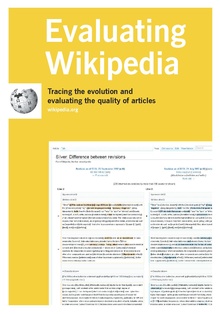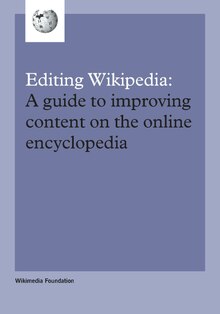User:WritingMan/Meetup/GSLRoundtable/10.20.2017
GSL Roundtable 10/2017: Editing Wikipedia to Teach L2 Writing[edit]
| October 20, 2017 | |
| Massachusetts Institute of Technology | |
| Cambridge, MA |
Overview[edit]
Wikipedia, now in its 16th year, remains an online space where accuracy, neutrality, and fair representation matters. Empowering a diverse group of editors (including students!) to contribute to Wikipedia (the largest collaborative writing project in history!) is one way to ensure that high quality information is freely available to all.
This afternoon's workshop will train participants to become Wikipedia editors, and along the way they will cultivate a greater understanding of how to create classroom assignments that will engage and empower L2 students while reinforcing core writing and communication skills.
Participant list[edit]
Please add your Wikipedia username below

Click "edit source." Add the # sign (to continue numbering.)
Then, create your signature by typing four tildes [~] in a row and hitting "Save changes."
- EricGrunwald (talk) 16:37, 24 March 2017 (UTC)
Articles written or edited by my students[edit]
Photopolymerization-based signal amplification
Ecological stability (Pre-edit/Post-edit)
The Green Bubble (October 2016/Current)
Artificial Imagination (October 2016/Current)
FAQ[edit]
How reliable is Wikipedia?
- Check out Accuracy of content
Who edits Wikipedia?
- Check out Wikipedia#Community
Also worth knowing about
Thinking like a Wikipedian[edit]
Basic guidelines, communication customs, editing customs
The focus here is on developing your "Wikipedia hat," so you can read and evaluate Wikipedia articles based on Wikipedia's standards, not those from your own areas of expertise. (n.b.: Modified from exercise created by User:AmandaRR123)

Read over the following Wikipedia policy/guideline pages, and then use what you've learned to evaluate one of the articles listed.
(Hint: Read "nutshells" and intros most carefully, then skim the rest of each policy/guideline page. That will give you the sense you need.)
- Wikipedia:The five pillars of Wikipedia
- Wikipedia:The perfect article
- Wikipedia:Identifying reliable sources
- Wikipedia:Neutral point of view
- Wikipedia:Be bold
- Wikipedia:Your first article
- Wikipedia:What Wikipedia is not
- Wikipedia:Manual of Style
Articles to evaluate: pick one, and use your new "Wikipedia hat" to evaluate them. How might they be improved?
Rating and Communicating on Wikipedia
- What Class Labels mean (Featured Article, C-Class, Start-Class, etc.): Wikipedia:Version 1.0 Editorial Team/Assessment
- Wikipedia:The perfect article
- Wikipedia:Talk page guidelines
Thinking Like a Teacher Using Wikipedia[edit]
- Set up your class: Wikiedu Dashboard
- Do teacher trainings yourself
- Have students register, do basic trainings (automatically set up in Timeline)
- Discuss Wikipedia in class (great communicative task; questions in Timeline)
- Evaluate a good article, weak article, add comments in their own Talk page (so you can see them easily)
- Contribute to an article (can skip if time is short)
- Explore article topics to create or "contribute to substantially" (rather than word counts, make assessment based on adding 3-5 reliable sources
- Either peer-review topics or go over them yourself or both
- Start writing
- Peer-review articles
- Move to Wikipedia
- Informal in-class presentation, reflective essay
Some options for making your first edit[edit]
Citation Hunt: A tool from Wikimedia Foundation Labs to help where [[citation needed]]
WikiGrabber: Another tool to help find where [[citation needed]]
Training to edit Wikipedia[edit]
- Cheatsheet
- Wikipedia:Featured Articles
- Wikipedia:Policies and guidelines
- Help:Getting started
- Wikipedia:Starting an article
Going forward: some resources to help you determine what and how to contribute[edit]
In English[edit]
- WikiProject
- What Class Labels mean (Featured Article, C-Class, Start-Class, etc.): Wikipedia:Version 1.0 Editorial Team/Assessment
- Portals on wikipedia
- Missing articles
- Wikipedia:Stubs
- Wikipedia:Most-wanted articles
- Wikipedia:Translating
- Wikipedia:Red links
- Wikipedia:Women in Red
Other languages[edit]
- Find Wikipedia in your language from Wikipedia or go directly: http://de.wikipedia.org (German); http://es.wikipedia.org (Spanish), etc.
- Here it can get tricky, because there is some variability.
- Starting with left-side menu, you're trying to find lists of articles that need to be created (always in RED) or edited. Look in:
- left-side menu and see if there's an "Improve articles" link.
- "Help"
- seek Portals & Wikiprojects and scroll down to find articles that need creating (always in RED) or need editing.
- search directly on topics you're interested in and see if they need help; then check interesting links in that article to see if they need work, and check the Talk page of the article to see if it is part of a Wikiproject or Portal.
- Because there is variability in formats even across Portals and Wikiprojects, you may just have to poke around!
Good Digital Citizenship and Activism in Wikipedia: Underrepresented Groups and Topics[edit]
written by User:AmandaRR123, February 2016
Problem: Wikipedia is a globally distributed network where judgement of quality is not based around contributor expertise, but rather work according to the standards of the project itself -- the most legible unit of work is a good citation. As one of the oldest communities on the Internet, Wikipedia gives students to a chance to practice good digital citizenship: use their critical thinking skills to discover community values, norms and styles of communication, and contribute in a way that will make sense to other community members.
However, Wikipedia can, like many other communities, have a bias towards the status quo. Therefore, those working on issues related to underrepresented groups can expect to be accused of activism, bias, an agenda, as if those things do not already exist on Wikipedia
Digital citizenship is doubly important to those working on issues related to underrepresented groups: one must know how to communicate effectively using community standards to convince the Wikipedian community that changes in the status quo does not automatically equal violating policy, and that you are still partners in the same goal of wanting to improve the encyclopedia.
Resources we can draw from[edit]
- Google News
- Google Books
- Google Scholar Note! You can synchronize Google Scholar with your institution's library. Check it out!
- Better Googling: MIT Libraries Google search tips
